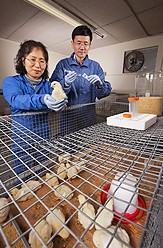Cracking down on Poultry Disease with egg yolk
Published: July 30, 2012
By: Sandra Avant (ARS, USDA)
It's not mother's milk, but egg yolk may be the closest remedy for boosting the immune system of newly hatched chickens against infectious diseases such as coccidiosis.
A major disease of chickens, coccidiosis is caused by intestinal parasites—single-celled protozoans in the genus Eimeria. Disease-affected birds are unable to absorb feed or gain weight, costing the poultry industry more than $600 million annually in the United States and $3 billion worldwide.
Scientists at the Agricultural Research Service Henry A. Wallace Beltsville [Maryland] Agricultural Research Center (BARC) and collaborators from different universities and the Mexican company IASA (Investigacíon Aplicada, S.A.) have developed a novel, antibiotic-free method that uses hyperimmune egg yolk antibodies to control intestinal poultry diseases.

ARS molecular biologist Sung Hyen Lee (left) and visiting scientist Seung Ik Jang prepare live coccidia to test a chick’s immunity. The chick should be immune because it previously consumed hyperimmune egg yolk antibodies from immune chickens. (D2494-2)
"Coccidiosis is associated with other pathogens, such as the one that causes necrotic enteritis—a prevalent gut disease of poultry," says avian immunologist Hyun Lillehoj, who works in BARC's Animal Parasitic Diseases Laboratory. "By controlling one, you're also reducing the impact of the other."
Good management practices and live vaccinations reduce the spread of coccidiosis, but alternative strategies are needed to help control drug-resistant strains and to enhance organic farming for the poultry industry.
Generally, a host can develop two types of immunity—active and passive—to resist infection. Passive immunity allows immune molecules that are already formed to be transferred from the hen, via the yolk, to the chick. Active immunity relies on vaccines to build immunity in the birds.
"When chicks hatch, they have no immunity to this pathogen. But if we give preformed immune proteins to 1-day-old progeny, they are ready to fight infection," she says. "It's similar to how immunity is passed to newborns through milk."
The method involves extracting antibodies from yolks of eggs from pathogen-free birds that have been hyperimmunized, meaning they possess greater-than-normal immunity due to an abundance of antibodies against the disease. Egg yolk is spray dried, mixed with feed, and given to chicks that have no immune protection right after hatching.
Lillehoj teamed up with ARS visiting scientist Sung Hyen Lee from the Rural Development Administration in South Korea, IASA scientist Eduardo Lucio, and other researchers to conduct different experiments to demonstrate the efficacy of inducing passive immunity against coccidiosis.
One-day-old broiler chickens were continuously fed a standard diet containing a commercially available egg yolk powder prepared from hens hyperimmunized with multiple species of Eimeria. They were then given a challenge infection with live coccidia. Body weight gain between days 0 and 10 and fecal shedding between days 5 and 10 postinfection were analyzed. Chickens given 0.5 percent or less of the hyperimmune egg yolk antibodies had a significant increase in body weight gain, reduced fecal Eimeria shedding, and fewer gut lesions compared to control birds fed a nonsupplemented diet.
"It's very simple technology, and it works," Lillehoj says.
Based on these results, one company has developed a commercial product that can be fed to chickens to control coccidiosis. Similar technology may be used in the future to guard against other devastating poultry diseases.
This article was originally published in the U.S Department of Agriculture´s science magazine, Agricultural Research, July 2012. Engormix.com thanks for this huge contribution.
Source
Sandra Avant (ARS, USDA)Related topics:
Mentioned in this news release:

Recommend
Comment
Share
15 de agosto de 2012
Dear Sandra (USDA)
It is a good method to fight against coccidiosis. But the problem will be for vaccines. That there is' a cross-immunity, because there are several Eimeria species. On the other hand it will be the price of these additives based on egg yolk. If they are expensive as vaccines, poultry farmers will refuse their use
Recommend
Reply
15 de agosto de 2012
Dear author,
It looks very much acceptable and ideal for controlling intestinal status from the disease angles due to bacterial and protozoan infections. The extent I was happy to know the idea at the same extent thought about the biological cycle of poultry and mechanism of transferring passive immunity to yolk through female parent metabolism and the complex mechanism involved for growth of the ovary and development of ovary and ovulation process, time taken to accumulate the immune- globulin in the egg yolk for specific diseases though portal circulations are few more points need examination. How far it is established that the highly rich immunity inducing proteins from SPF eggs would reach to blood levels to additionally support the inherent passive immunity for the gut disease protections. If I have to add 0.5% in the starter feed or any other special products during the period from 1-10days how the product will maintain the immune-globulin quality ideal for getting absorbed and support for immunity of development when it may come contact with external environments like feed and water etc. Further, if I think I can use this product for feeding to breeder birds to push more immune-globulin in side the female parent then i may expect support the mother to take up the biological translation of moving the items to yolk effectively within biological conditions inside body and body system.Again the SPF egg cost and product developments may impact the breeder feed cost and it can be acceptable only when the costing come through. However for active immunity we have to carry on the vaccinations for viral diseases till alternative to no vaccination situation appear to us.
I would like to add that many broiler and layer production units have some nutritional formula e which contain MBM and fish meal and tallow which are more attracting bacteria to the gut when these get moisture contacts during processing of feed or storing in room temp. So many nutritionist suggest to add antibiotics in the formulations or post feeding time to control these bacteria or feed pro-biotic products without sealing the more chances of allowing bacteria through these sensitive products to reach gut. Thus I feel veg feeding would be ideal for limiting bacterial load and reducing uses of antibiotics and more using pro biotic concepts. Thank you for allowing me to write some thoughts. Dr M. Rath, Poultry Consultant in India
It looks very much acceptable and ideal for controlling intestinal status from the disease angles due to bacterial and protozoan infections. The extent I was happy to know the idea at the same extent thought about the biological cycle of poultry and mechanism of transferring passive immunity to yolk through female parent metabolism and the complex mechanism involved for growth of the ovary and development of ovary and ovulation process, time taken to accumulate the immune- globulin in the egg yolk for specific diseases though portal circulations are few more points need examination. How far it is established that the highly rich immunity inducing proteins from SPF eggs would reach to blood levels to additionally support the inherent passive immunity for the gut disease protections. If I have to add 0.5% in the starter feed or any other special products during the period from 1-10days how the product will maintain the immune-globulin quality ideal for getting absorbed and support for immunity of development when it may come contact with external environments like feed and water etc. Further, if I think I can use this product for feeding to breeder birds to push more immune-globulin in side the female parent then i may expect support the mother to take up the biological translation of moving the items to yolk effectively within biological conditions inside body and body system.Again the SPF egg cost and product developments may impact the breeder feed cost and it can be acceptable only when the costing come through. However for active immunity we have to carry on the vaccinations for viral diseases till alternative to no vaccination situation appear to us.
I would like to add that many broiler and layer production units have some nutritional formula e which contain MBM and fish meal and tallow which are more attracting bacteria to the gut when these get moisture contacts during processing of feed or storing in room temp. So many nutritionist suggest to add antibiotics in the formulations or post feeding time to control these bacteria or feed pro-biotic products without sealing the more chances of allowing bacteria through these sensitive products to reach gut. Thus I feel veg feeding would be ideal for limiting bacterial load and reducing uses of antibiotics and more using pro biotic concepts. Thank you for allowing me to write some thoughts. Dr M. Rath, Poultry Consultant in India
Recommend
Reply

Would you like to discuss another topic? Create a new post to engage with experts in the community.














